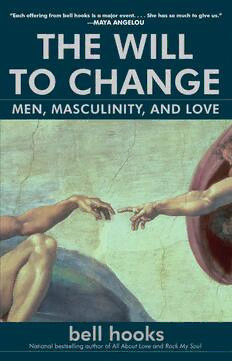
The Will to Change: Men, Masculinity, and Love PDF
Preview The Will to Change: Men, Masculinity, and Love
1 2 Also by bell hooks Ain’t I a Woman: Black Women and Feminism Feminist eory: From Margin to Center Talking Back: inking Feminist, inking Black Yearning: Race, Gender, and Cultural Politics Breaking Bread: Insurgent Black Intellectual Life Black Looks: Race and Representation Sisters of the Yam: Black Women and Self-Recovery Teaching to Transgress: Education as the Practice of Freedom Outlaw Culture: Resisting Representations Art on My Mind: Visual Politics Killing Rage: Ending Racism Reel to Real: Race, Sex, and Class at the Movies Bone Black: Memories of Girlhood, Vol. 1 Wounds of Passion: A Writing Life Remembered Rapture: e Writer at Work Happy to Be Nappy All about Love: New Visions Feminist eory: From Margin to Center Where We Stand: Class Matters Salvation: Black People and Love Communion: e Female Search for Love Rock My Soul: Black People and Self-Esteem 3 4 1230 Avenue of the Americas New York, NY 10020 Copyright © 2004 by Gloria Watkins All rights reserved, including the right to reproduce this book or portions thereof in any form whatsoever. For information address Atria Books, 1230 Avenue of the Americas, New York, NY 10020 ISBN-10: 0-7434-8033-3 ISBN-13: 978-0-7434-8033-8 First Atria Books hardcover edition January 2004 ATRIA BOOKS is a trademark of Simon & Schuster, Inc. Visit us on the World Wide Web: http://www.SimonSays.com 5 “Alchemically transforming lead into true gold, men are given the opportunity to burn, to be touched by an inner fire, to live a life of substance, to be changed utterly.” is book is dedicated to the memory of my grandfather, Gus Oldham —burning, a heart on fire, whose love, stronger than death, illuminates. 6 In our rapidly changing society we can count on only two things that will never change. What will never change is the will to change and the fear of change. It is the will to change that motivates us to seek help. It is the fear of change that motivates us to resist the very help we seek. —Harriet Lerner, e Dance of Intimacy 7 Contents Preface About Men 1 Wanted: Men Who Love 2 Understanding Patriarchy 3 Being a Boy 4 Stopping Male Violence 5 Male Sexual Being 6 Work: What’s Love Got to Do with It? 7 Feminist Manhood 8 Popular Culture: Media Masculinity 9 Healing Male Spirit 10 Reclaiming Male Integrity 11 Loving Men 8 Preface About Men W hen Phyllis Chesler’s book About Men was first published more than ten years ago, I was excited. At last, I thought then, a feminist thinker will explain this mystery—men. Back then I had never shared with anyone the feelings I had about men. I had not been able to confess that not only did I not understand men, I feared them. Chesler, with her usual “take no prisoners” daring, I was certain, would not simply name this fear, explain it, she would do much more: she would make men real to me. Men would become people I could talk to, work with, love. Her book was disappointing. Filled with quotes from numerous sources, newspaper clippings of male violence, it offered bits and pieces of information; there was little or no explanation, no interpretation. From that time on I began to think that women were afraid to speak openly about men, afraid to explore deeply our connections to them—what we have witnessed as daughters, sisters, grandmothers, mothers, aunts, lovers, occasional sex objects—and afraid even to acknowledge our ignorance, how much we really do not know about men. All that we do not know intensifies our sense of fear and threat. And certainly to know men only in relation to male violence, to the violence inflicted upon women and children, is a partial, inadequate knowing. Nowadays I am amazed that women who advocate feminist politics have had so little to say about men and masculinity. Within the early writings of radical feminism, anger, rage, and even hatred of men was voiced, yet there was no meaningful attempt to offer ways to resolve these feelings, to imagine a culture of reconciliation where women and men might meet and find common ground. Militant feminism gave women 9
